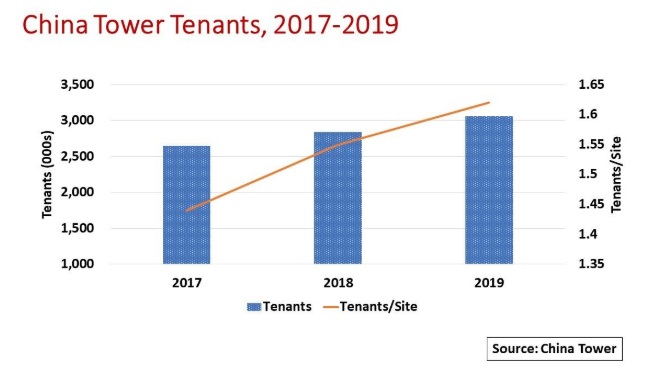Think about this. Beijing-based China Tower Corporation (OTC: CHWRF) owns and operates 2,000,000 towers! That makes China Tower the world’s biggest developer of cell phone tower sites.

To put this metric in context, the FCC’s database of registered towers in the U.S. is around 200,000. The largest U.S.-based tower company and the largest outside of China, American Tower (NYSE: AMT), has a global portfolio of about 180,000 towers in 19 countries including the U.S., India and countries in Central and South America, Africa, and Europe.
China Tower’s operations are an order of almost 10X magnitude greater than its nearest comparable tower operator.
Consider the scale on which it operates. China’s land mass covers approximately 3.7 million square miles, slightly less than the U.S., but China is the world’s most populous country with nearly 1.4 billion people compared to 330 million in the U.S.
Over 100 cities in China have more than one million people. Shanghai with 26.9 million people is the largest followed by Beijing at 20.4 million. Nearly 60 percent of the total population is in urban areas and growing every year. By contrast, the U.S. has 50 metropolitan areas of 1 million or more.
China Tower is a state-owned enterprise formed from the merger of tower assets from China’s three big, state-owned telecommunications service providers (TSPs) – China Mobile, China Unicom and China Telecom – that are both customers and shareholders. The three TSPs together own 69 percent of the shares of China Tower. China Reform, a state holding company owns another 4-5 percent with the balance held by public shareholders.
The company reported total revenues for 2019 of U.S.$10.8 billion. Across its operating base, China Towers has over three million tenants and an occupancy rate of 1.62 tenants per site. Throughout mainland China, the company provides these carriers comprehensive communications infrastructure services including tower construction, tower maintenance, ancillary facilities management and support services.
China Tower’s three business segments are Towers, Distributed Antenna Systems (DAS) and what it calls, the Trans-sector Site Application and Information (TSSAI) and Energy operations business.
The Tower business segment develops and manages macrocell and small cell sites for its TSP customers. Of the three, China Mobile is the largest wireless carrier in the world with 947 million connections. The smaller China Unicom and China Telecom had 309 million and 323 million wireless connections, respectively, at year-end 2019. The Towers business accounted for 92 percent of the China Towers’ total 1Q20 revenues.
The DAS business segment helps the TSPs to extend their radio frequency (RF) signals inside buildings. At year-end 2019, China Towers had DAS systems that covered nearly 2.6 billion square meters of building space. In addition, the company has deployed DAS for China’s extensive rail transportation systems. At year-end 2019, DAS covered 3,370 km of subways and 5,318 km of high-speed railways.
The TSSAI and Energy business segment leverages microcell and small cell sites for Smart Cities and industrial uses. TSSAI provides site infrastructure, maintenance services and power generation and back-up services for different types of nationwide or regional networks. DAS and TSSAI together account for just seven percent of China Towers’ revenues but are the fastest growing segments.
China Towers’ 2019 capital expenditures were U.S.$3.8 billion. New site construction and augmentation accounted for 73 percent of the total. Site replacement and improvements took another 15 percent while IT systems and corporate facilities tallied the remaining 12 percent.
China Tower’s strategy to support its TSPs with their 5G rollouts is called “One Core and Two Wings” which is essentially a shared infrastructure approach that enables the wireless carriers to deploy 5G rapidly anywhere in China Towers’ coverage area. To that end, Ericsson (NasdaqGS: ERIC) recently signed a technology and strategic partnership deal with both China Unicom and China Telecom. The two carriers will utilize Ericsson’s radio system products and solutions to build a shared 5G network on China Tower’s infrastructure.
By John Celentano, Inside Towers Business Editor




Reader Interactions